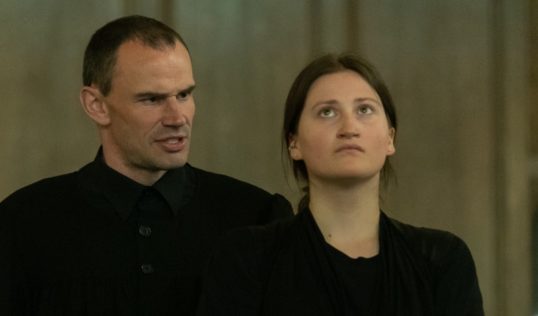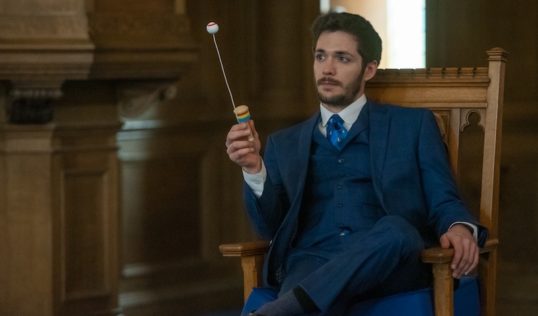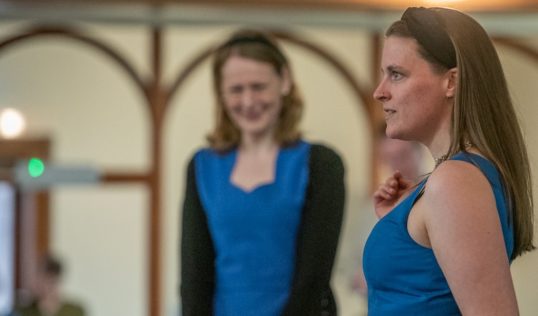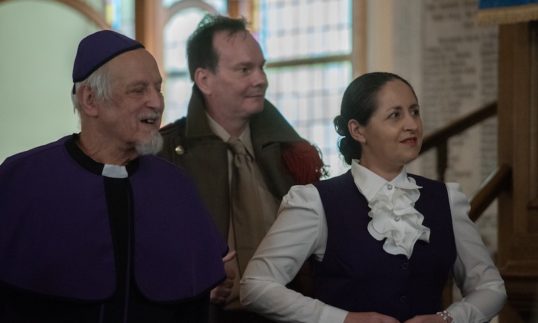The Lark
★★★★☆ Fiery
Bellfield: Tue 4 – Sat 8 June 2019
Review by Thom Dibdin
There is fire in the belly of EGTG’s telling of The Lark – Jean Anouilh’s take on the story of Joan of Arc – at Bellfield in Portobello to Saturday.
Using a 21st century translation by Gill Taylor and directed by Claire Wood, the fire which consumed Joan in her martyrdom comes not so much from the pyre which was lit beneath her, but from inside.
This is largely thanks to an entrancing and clever performance from Clara Doherty, who makes her Joan of Arc a ferociously determined young woman, where all around her see a flighty young thing. Here is a complex mix of arrogance and humility – ultimately tempered by an understanding of the politics of her own trial.
Using the nave of deconsecrated Bellfield church to its full advantage, Wood ensures clarity to the complexities of Anouilh’s structure, which tells Joan’s story through her own memories, recalled during the trial by her English captors which ended in her execution.
The focus then, is not on the glorious battles in which Joan led the French army, but the crucial points by which she arrived there. Persuading first her parents to let her travel, then the local squire Beaudricourt to lend her a horse and an escort to meet the young Dauphin, Charles VII, who she then persuaded to let her lead his army.
Not to forget her visitation by angels, who told her to do all these things. And the question of whether these voices came from God or from her own imagination.
obsequious and conflicted
These meetings and persuasions dominate a first half which positively whizzes by. Gregor McElvoguie as the stiff-backed Earl of Warwick who paid for the trial and Richard Godden as the obsequious and conflicted Bishop Cauchon who took his bribes to bring it about, provide a strong basis around which Joan’s memories can take place.
Doherty’s early delivery has a tendency to quietness, and the scenes between Joan and her blustering, aggressive father (Alastair Lawless) and more caring mother (Claire Morand) are not quite as sharp as they might be. Although Rowan Fieldhouse is excellent as her little sister, who snitches on her to her dad.
Any trepidation in the delivery is forgotten by the time of Joan’s meeting with Chris Allan as the lecherous Beaudricourt, who assumes she is there to exchange her virtue for a favour. It is a beautifully constructed scene, with both Doherty and Allan giving their characters full range of emotional development during the interplay and verbal sparing.
There’s real meat to be found in the court scenes with Charles VII, too. Keegan Siebken has this fearty wee man down pat, happily dominated by his wife, mother-in-law and the mistress who she procured for him, and using them as protection against the more troubling advisors of his court, the Archbishop (Iain Kerr) and head of his army (Rebekka Pudrbaugh).
knowing and conniving
Kate Stephenson does glaikit very well as his wife, the Little Queen, with Hilary Davies the real power behind the throne as her mother, Queen Yolande and Hannah Bradley rather more knowing and conniving as his mistress, Agnes of Sorel.
But it is the scene between Joan and Charles which is once again key. And it shows great skill from all concerned as it ebbs back and forth while she reveals the secrets of her success in conquering fear by accepting it, and realising that everyone else will be more frightened than you are.
As a telling, the production gets right in amidst the politics of Joan’s trial – her position as a prisoner of war and the role of the church in the secular attempt to discredit her. As a modern interpretation Gill Taylor’s translation works very well indeed, making the whole thing clear.
utter contempt
However the second half, where the focus is more on the trial, isn’t as engaging as the first. Until, that is, the arrival of the vicious, parcel-mouthed Inquisitor, played with an air of utter contempt by Alan Patterson. At which point the parallels with political trials everywhere, and The Crucible in particular, become a lot more apparent.
Part of Wood’s scheme for the production lies in the addition of modern music, reinterpreted for a choral setting by MD Neil Colquhoun. He has done so extremely well and the 19-strong cast provide a sweet sound. But it doesn’t always fit as it might: The acoustic balance is not always good with the music drowning out the actors and, towards the end, the songs simply swamp the plot, without always adding a great deal.
However, in a time of long physical peace in Europe, when wars rage on social media and other arenas undreamed of in Joan’s time, this is a strong reminder of the very real power to be had from those who can conquer their own fears and stand up against those who believe – or appear to believe – that their authority is divine.
A production which has the guts to experiment and step outside the norm. It doesn’t always work as it might, and is a bit on the long side, but this Lark is fascinating to watch and has plenty to say for itself.
Running time: 2 hours and 45 minutes (including one interval)
Bellfield, 16B Bellfield Street, Portobello, EH15 2BP
Tuesday 4 – Saturday 8 June 2019
Evenings: 7.30pm.
Tickets and details: Book here.
ENDS






















Going tonight. Looking forward to it even more after reading this.